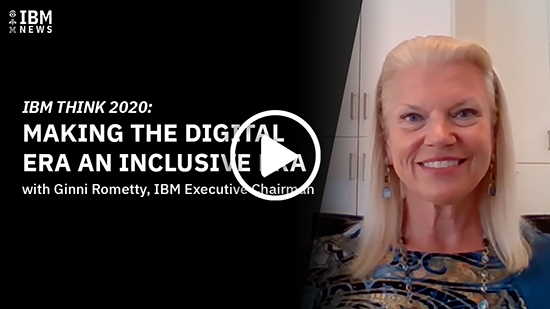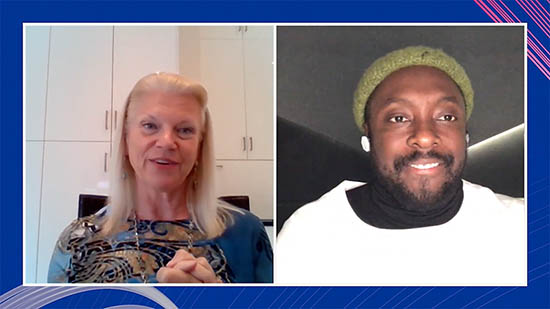THINK 2020 stories
Ginni Rometty and will.i.am: Keeping People in the Digital Equation
By Trish Hall
May 5, 2020
When Ginni Rometty was a child, her family needed food stamps to get by. Now the executive chairman of IBM, she believes strongly that anyone, no matter their origins, can succeed if given the right help, the right tools.
Rometty’s belief in the need to help people help themselves underlies a program she has overseen, P-TECH (Pathways to Technology Early College High School). In partnership with schools and community colleges, P-TECH has provided nearly 200,000 disadvantaged students with the academic, technical and workplace skills and experiences they need to end up in good jobs—what she calls “new collar jobs.”
In her presentation Tuesday at IBM’s Think Digital virtual conference, Rometty announced that the company is expanding the P-TECH program through a new digital platform for workplace learning and digital skills, called Open P-TECH.

Watch highlights from IBM Executive Chairman Ginni Rometty's Think Digital session
As difficult as these times are, with the pandemic around us and many jobs lost, Rometty said, “You can get relevant education to anyone in the world so they can be successful in this digital era.”
This is the perfect time, she said, to embrace new models and to try to create a more inclusive society—like one that also provides broadband access to the 21 million Americans who do not have it.
After that announcement, Rometty interviewed will.i.am, a businessman, philanthropist and seven-time Grammy Award–winning musician who shares her passion for helping people get the skills they need.
“Will shares the same beliefs I do,” Rometty said. “You and I both believe, from our own experiences, that anybody can succeed given the right environment.”
Like Rometty, will.i.am said he didn’t think of himself as being poor as a child, because he had role models in his family who stressed hard work and achievement. “I really believe it was the collective—there was the school, the love from my mom and my family, my uncle, my friends, and then the access to information and culture.”
“We Were Always Philanthropic”
The founder of the Black Eyed Peas, will.i.am was born William Adams. Growing up, he took a bus three hours each day to a science magnet school in the affluent section of Los Angeles called Brentwood, commuting from his home in a Mexican neighborhood in East Los Angeles where his was one of a few African American families.
He said he didn’t realize he was poor until his Brentwood school conducted a drive for canned foods to give to needy families—and then distributed them in his neighborhood. Even though they were poor, he said his family always helped others.
“We would hand out food to the poor folk—and we were the poor folk,’’ he said. “We were always philanthropic.”
Through his foundation, i.am.angel, he now helps children in poor neighborhoods succeed in school and then helps them go to excellent colleges, through both encouragement and financial assistance. His foundation gets those students into top schools by showing them an alternative path. “If their grades are high enough, they get to go to Lakers games and concerts, to participate in robotics competitions,’’ he said. “A lot of times, when you have kids in the hood, what’s an A when they’re dealing with crime, with drugs, with peer pressure? You have to entice a kid, inspire a kid.”
A Push for Inclusion
Investing in kids, will.i.am said, has shown him how misplaced society’s values often are.
“In the past six years,” he said, “since I’ve had my AI company, we’ve raised 170 million bucks. My foundation has raised 11 million. To make machines smart, look how much you can raise. To make humans smart, we’re kind of struggling.”

Rometty in conversation with will.i.am
Rometty asked will.i.am what he thought might be the greatest lesson of the COVID-19 crisis.
“I’ve learned,” he answered, just “how fragile the world is. The world is super fragile. You took for granted the people at the supermarket, the people that clean the streets and take out the garbage. The delivery service folks. And it turns out those people are the most important people in society. That’s what I learned. And now in this digital age, what I learned is that we have to be more human. Everyone matters.”
Rometty agreed, saying that despite the current troubles, she remains optimistic. “There is a way to make this digital era not only human,’’ she said, “but inclusive for everyone.”
→ Watch a replay of Ginni Rometty's Think Digital session